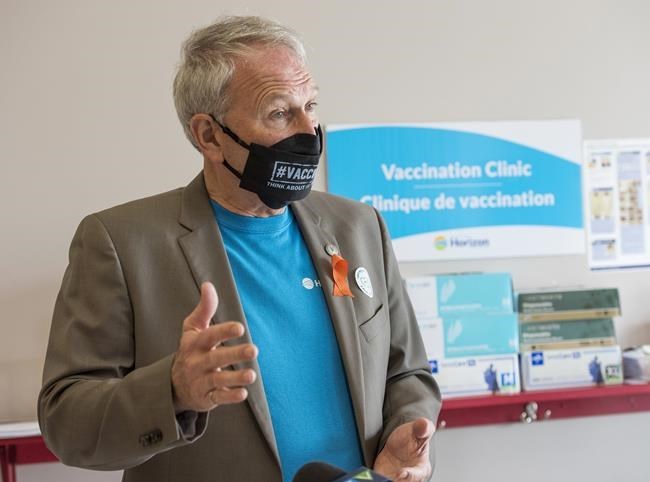FREDERICTON — As New Brunswick reimposed a state of emergency Friday to deal with a sudden surge in COVID-19 cases, a senior health official admitted the province was wrong to lift all health-protection orders in late July.
The province has recorded 866 new cases so far this month — nearly a quarter of the total reported since the beginning of the pandemic in March 2020.
And health officials confirmed Friday that the province's hospitals are struggling keep pace with a surge in infections caused by the highly contagious Delta variant.
Dr. Gordon Dow, infectious disease specialist with the Horizon Health Network, said the lifting of health-protection measures almost two months ago was an error.
"Many other jurisdictions made the very same mistake," he told a technical briefing in Fredericton. "Alberta made the mistake, except they made it a month before us. Saskatchewan made the mistake. The United States made the mistake. The U.K. made the mistake. There were a lot of mistakes made."
Dow said the province's previous efforts to combat the virus focused on a successful "elimination strategy" that was used to rapidly shut down seven distinct outbreaks.
But the province wasn't ready for the Delta variant, he said.
"Did we under-call this one? I would say yes, and I think most New Brunswickers would agree with that," he said. "But I would also say that we got it right 85 per cent of the time.
In late July, the province became the first jurisdiction in Atlantic Canada to drop all of its COVID-19 restrictions. At the time, some infectious disease experts warned New Brunswick would face a surge in Delta-variant cases in the fall, mainly because of Premier Blaine Higgs' decision to drop mask requirements in indoor public places.
The mask order was reinstated on Wednesday, and on Friday, Higgs introduced a number of other health-protection measures. They include new rules to limit contacts, ensure physical distancing and require certain businesses and events to have vaccination or masking-and-testing policies.
Asked if it was an error to lift all health-protection orders in July, Higgs said that decision was based on the best available advice.
"It was the right thing to do in relation to us getting to see family again and to have summer back with family ... and to get a reprieve," Higgs told a news conference after the briefing. "It's convenient to try and get a gotcha moment here, but with the facts available at the time ... I would have made the same decision that I did."
Higgs, however, then changed his tone and reflected on other big decisions he has made over the years.
"Through my life, there's lots of times, in hindsight, I would have done things differently," he said. "And, yes, this could this be one of them, in hindsight."
Health officials also confirmed Friday the deaths of three more people infected with COVID-19, all of them over the age of 70, bringing the province's total to 52. There were 78 new COVID-19 cases, 59 of which involved people who were not fully vaccinated.
"It is clear that the current situation is very serious," said Jennifer Russell, the province's chief medical officer of health. "The pace of this fourth wave is beyond what we anticipated .... We are now at the tipping point."
She issued a warning to fully vaccinated New Brunswickers, reminding them that they can still contract the Delta variant and pass it on to vulnerable individuals, the elderly and unvaccinated children.
Of the 573 active cases reported Friday, 31 were in hospital, including 15 in intensive care.
"These past three weeks have shown us that COVID-19 and its variants are not going away easily," said Health Minister Dorothy Shephard, noting that the province's caseload has increased from an average of 10 new cases a day to 67 cases a day.
"We are now experiencing a surge unlike anything we have witnessed in our province .... It's upsetting, and it's frightening."
Shephard said those hospitalized with COVID-19 typically spend 15 days recovering, but that number jumps to 21 days if they are admitted to intensive care.
As of Friday, 78.4 per cent of eligible New Brunswickers had been fully vaccinated, and 87.4 per cent had received their first dose.
This report by The Canadian Press was first published Sept. 24, 2021.
— By Michael MacDonald in Halifax
The Canadian Press




